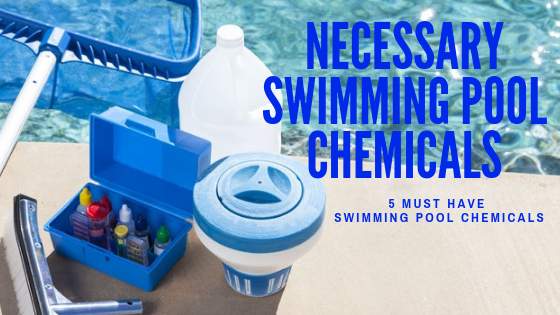What chemicals are necessary for your swimming pool?
5 Must Have Swimming Pool Chemicals
We know that pool chemistry is one of the most boring and demanding part of pool maintenance but it is most integral also. Every pool owner must be aware of this chapter in pool maintenance or best you can let a professional pool service company like Crytal Pool to take care of your swimming pool water. To have a great swimming season you will need to skim, brush, vacuum and filter the pool water but you will also need to test you pool water regularly to maintain a balanced chemistry. If this step is ignored, it can have serious implications on your pocket as well as on your health. Some of the most basic stuff that is required in swimming pool maintenance are test kit, granular chlorine, algaecide, total alkalinity increaser, pH+ incraeser or ph- decreaser and sometimes calcium hardness increaser.
Your pool water needs to be maintained so that it carries correct balance of chemical elements in order to provide safety for swimmers and additionally to ensure that your pool equipment run properly. Water with improper chemical balance can not only harm various parts of your pool but also it can cause skin and eyes irritation, and the water would get very cloudy.
At Crystal Pool we claim to be the expert at maintaining pool water chemistry and we use high quality international standard swimming pool chemicals that are recommended pool maintenance.
1. Chlorine
One of the most widely used chemical in pool cleaning is Chlorine. The reason is that it’s very inexpensive and its highly effective at killing bacteria. It is also known as predator amongst all the pool chemicals becaue it kills the bacteria in your pool waters. Well to put things chemistry perspective, actually what happens is that Swimming pool chlorine reacts with water to form hypochlorous acid and hydrochloric acid. Hypochlorous acid is a hyper active form of chlorine and it penetrates the bacterial cells and other likely unsafe microorganisms, it kills them so that there is no health risk for swimmers.
Chlorine is used for day to day pool maintenance, cleaning and sanitizing but it is also used for pool shocking. Pool Shock treatments are done by raising the chlorine levels in the pool or Super-chlorinating a swimming is done at pool openings and if there has been extensive use of pool and there is a need for extra sanitization during swim season.
Picture “PREDATOR” Granular Chlorine
2. Algaecide
Have you ever been surprised when your swimming pool suddenly turned from crystal clear blue pool to green, murky and cloudy pond? This could happen due to number of reasons. Maybe you did not pay close attention to your pool chemistry and pool chemicals got off balanced. Or the pool water was not circulated enough through your filtration system or someone went swimming with dirty swimsuit. It can happen even to the experienced pool users. Even carefully maintained swimming pools can face algae growth in the pool. No matter what the reason is, you are now faced with green monster in your pool which, if left unattended, will grow very quickly and can even clog your pool’s filter. You have to get rid of this green monster called algae from your pool waters as soon as possible.
If used under professional supervision, swimming pool algaecides can turn a cloudy pool into a crystal pool in less than 24 hours. It is advised that It is best to not to swim in the pool and wait for minimum 30 minutes after algaecide is added to your pool. Prevention is better than cure.
Picture “MONSTER” Algaecide
3. pH – Possible Hydrogen Ions
By definition in chemistry, “pH is a scale used to specify how acidic or basic a water based solution is”. Therefore the pH of water is a unit to measure total acid-alkalinity present in your pool. It is an important factor of you pool water chemistry because it will determine the efficiency of the sanitizer being used in the pool.
As we know that Acids are those chemicals that form Hydrogen Ions (H+) once dissolved with water. Whereas Bases (Alkaline materials) are those compounds which form Hydroxyl Ions (OH-) when dissolved with water. Therefore, the Ph stands for “Possible Hydrogen Ions”. Although some people refer to it as “Power of Hydrogen”, that is technically incorrect.
It is advised that you keep track of your pool water PH history and data. It will help you understand your pool water behavior. Your test kit is your most reliable partner in your arsenal of pool maintenance equipment.
In your test kit, Ph scale runs from 0 to 14. The recommended Ph range for swimming pool water is 7.2 to 7.6. The ideal Ph of your pool should be 7.4. If you have Ph of 7.0 it is considered neutral. Anything below 7.0 are acidic, Ph values above 7.0 are consider to be basic.
4. PH Enhancer
Pool grade compound of sodium carbonate is what we use to raise pH levels.
Here are some side effects If pH falls too low (below 7):
Water becomes acidic.
Eye & skin irritation occurs.
Corrosion – Heater element may corrode
Pump impellor & other metal fittings on the pool will corrode.
Dissolved metals may leave stains on the walls.
Etching of tile and plaster
Rapid loss of disinfectant
Picture “Enhancer” PH+
5. PH Decliner
We used pool grade is muriatic acid to lower the PH levels of pool water.
Here are some side effects If pH is too high (above 8):
Chlorine activity is slowed and inefficient.
Scale formation on the walls
Water becomes cloudy and algae growth.
Filter is overworked & may become choked.
Eye & skin irritation may occur.
Picture “Decliner” PH+
Apart from above there are many other types of chemicals that are used in various circumstances. When it comes to pool chemicals it is best to let a trained pool technician or professionals handle your pool water chemistry. It is extremely important to keep your pool water clean and clear by using pool cleaning chemicals. Happy swimming.


Recent Comments